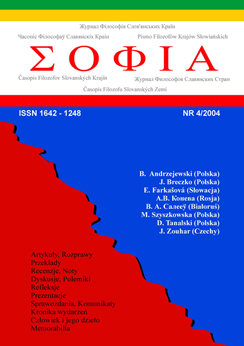
Polemics about Values of United Europe
Polemika wokół wartości zjednoczonej Europy
Introduction to the Polemics about Values of United Europe
More...
Introduction to the Polemics about Values of United Europe
More...

The Round Table of The Philosophers of Slav Countries (30 V 2003)
More...
This article is an attempt at reconstructing a basic concept, which is the philosophical construct called Russian Slavophilism, i.e. the concept of integralily. It is the object of detailed analysis here because it focuses all of the most important dimensions of this intellectual construct, not only the social, but the epistemological and metaphysical dimensions as well. Another intention of this study, delimited by the specificity of the concept as mentioned, was an endeavor to reach a multi-facetted reconstruction of 19th century Russian thought, the specifics of its cultural, religious, and political predisposition, and its localization within the broad context of European philosophical thought.
More...
Polemics about Values of United Europe
More...

The author sketches the main trends in Milosz's historiosophic views. He starts with contrasting Milosz's tendency towards a disinterested contemplation of being with his propensity for the understanding of "doing" and the related need of involvement. Miłosz analyzes the extraordinary "acceleration oj history" in the last two centuries. He alsa tries to grasp the exceptionally complicated and tragic sequence of events in a poorly known part of Europe between Germany and Russia, on the territory of old-time Poland. The analysis of Milosz's views on a widely understood globalization concludes the text.
More...




The process of globalization is characterized by several paradoxes, in this paper I will consider one of them - the relation between local and global, especially in the cultural context of the globalization. The paper focuses on the necessity to search for alternatives to the homogenizing model of the globalization and on the necessity of cultural diversity.
More...
The subject matter of this paper is the relation between theoretical cognition and hermeneutics as the practice of comprehension and interpretation. Pointing to the disjoint character of both these fields, the author invokes their traditions as well as differences in the understanding of their definitions and functions. At the same time he points to the mutual interaction of cognition as well as comprehension and interpretation. The author views hermeneutics not as a negation of philosophy but, rather, as a complementation of its cognitive operations and functions. As a corollary, in the awareness of the role of comprehension and interpretation in cognition, i.e. in the so-called hermeneutic consciousness, he observes a subsequent step in attaining self-knowledge by philosophical thought.
More...
Book Review: Piotr Gutowski, Między monizmem a pluralizmem. Studium genezy i podstaw filozofii Johna Deweya, Wydawnictwo KUL, Lublin 2002, ss. 265
More...
Polemics about Values of United Europe
More...
Polemics about Values of United Europe
More...
Book Review: Tadeusz Szkolut (red.), Humanizm. Tradycje i przyszłość, Studia etyczne i estetyczne, Zbiór VI, Wydawnictwo UMCS, Lublin 2003, ss. 301
More...
The Round Table of The Philosophers of Slav Countries (30 V 2003)
More...
This essay contains the analysis of the basic conceptions of Szlemkewycz's book, Filosojija, based on the material of the doctoral dissertation written under the supervision of Moritz Schlick. The work of Szlemkewycz is mostly independent of Schlick's thought, but in certain parts of the text, e.g. while defining the subject matter of ethics, Szlemkewycz follows the lead of his master. This work also sheds light on the philosophical work of Schlick, so tragically interrupted by the death of the great Wiener.
More...
Book Review: Владимир В. Коклюхин, История общественных двиҗений и политических партий, Брест 2002, 382 с.
More...